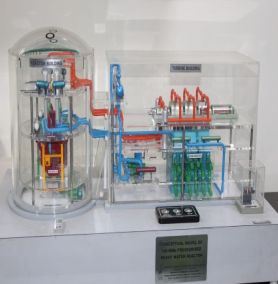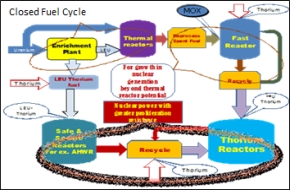1
SANESS
School of Advanced Nuclear Energy System Studies
Mission:
To pursue design studies and analysis of advanced nuclear energy systems with features to enhance intrinsic safety, security, proliferation resistance and sustainability.Programs:
- Reactor systems and applications
- Fuel cycle studies including thorium fuel cycle
- Accelerator Driven Systems
- Risk studies
- Emergency planning and management studies
- Sustainability parameter assessment
- Global database

Major Programme of SANESS
Nuclear energy offers a dependable option to meet a significant part of the anticipated increase in electricity demand in a sustained manner, while reducing the potential environmental concerns related to CO2 emission. Large-scale deployment of nuclear energy, however, warrants assessment and quantification of potential threats and concerns related to safety, security and proliferation resistance and optimise approaches to minimise such threats. The school will facilitate studies related to these issues in a scientific manner. The objective of the school will include:

- Train national and international trainees in different aspects of safety, security and proliferation resistance.
- Identification of vulnerabilities and gaps in the design of nuclear reactor systems and fuel cycle facilities. This shall also include identification of level of emergency planning required for reactor systems so as to decide on plant size and number of units at a given site.
- Evaluation of performance indicators in safety, security and proliferation resistance and identification of intrinsic features facilitating enhanced performance in these directions.
- Studies related to adoption of technologies that fulfill the different criteria for sustainability such as optimum utilisation of natural resources, comparative economics of different fuel cycles and reactor systems, and their environmental impacts.
- Interactive distance teaching through on-line classrooms in the key areas of nuclear power plants such as regulatory process, safety culture, radiation protection, nuclear law, etc.
- Publication of documents on findings.
- Organisation of seminars and conferences.
Departments
The school shall consist of following major departments to carry out studies to meet its objectives:
-
Department of reactor systems and applications
This shall facilitate carrying out comparative studies as well as development of new systems and shall include separate section on non electrical applications such as sea-water desalination, hydrogen production, district heating, and industrial heating. -
Department of fuel cycle studies
This department shall facilitate both front-end and back-end of different fuel cycles. Assessment as regards comparison of fuel types and cycles as far as efficiency of fuel utilisation, production of minor actinides and waste are concerned. Fuel cycle studies related to partitioning and transmutation of spent fuel, waste management and storage shall also be carried out. -
Department of thorium fuel technologies studies
Thorium offers attractive long-term sustainability to the nuclear programme. It is also attractive in the sense that minor actinide production is very low as compared to uranium based systems. At the same time it offers many challenges related to both fuel fabrications as well as reprocessing, and hence needs to be extensively studied. This department shall facilitate these studies. -
Department of Accelerator Driven Systems (ADS)
Studies related to Accelerator Driven sub-critical reactor System for transmutation of transuranic nuclear waste in dedicated minor actinides burner reactor with inherent safety against power excursions shall be carried out. -
Department of risk studies
Based on Probabilistic Safety based Studies (PSA), the department shall facilitate studies related to safety hazard assessment, security threat potential assessment, and proliferation potential assessment for the reactor systems and fuel cycle facilities. Vulnerabilities and gaps in the design of nuclear reactor systems and fuel cycle facilities will be identified. Performance indicators in these directions shall be identified. -
Department of emergency planning and management studies
The studies related to responses subsequent to postulated accident scenario shall be carried out. Levels of emergency planning required for reactor systems and fuel cycle facilities shall be worked out so as to decide on plant size and number of units at a given site. One important consideration in siting nuclear power plant, especially for large scale deployment scenario, is demonstration of capability to administer emergency measures in the area surrounding the plant and enhance capabilities to address these issues quantitatively considering the infrastructure, population distribution, and site specific conditions. One can cite example of iodine distribution to population on two-wheelers. -
Department of sustainability parameters assessment
This shall facilitate studies related to adoption of technologies that fulfill the different criteria for sustainability. Main considerations are optimum utilisation of natural resources, comparative economics of different fuel cycles and reactor systems, and their environmental impacts. Appropriate transition time between fuel cycles/ reactor systems to sustain the growth shall be identified. -
Virtual reality laboratories
These laboratories shall facilitate virtual walkthroughs through the nuclear reactor systems and fuel cycle facilities for visualising the potential areas where vulnerabilities to different threats need to be addressed. -
Global databases and analysis unit
A global database with large amount of information on energy generation, economics, environmental effects, and future projections of growth in energy sector in general and nuclear energy in particular. This unit will collect and compile information and identify gaps. Energy planning studies for a given region can be studied. -
Department of interactive distance teaching
This department shall facilitate interactive distance teaching through on-line classrooms in the key areas of nuclear power plants such as regulatory process, safety culture, radiation protection, nuclear law, etc. The concept of one main classroom and multiple remote classrooms with high definition interactive video based interaction between all the classrooms can be adopted. This shall also facilitate simulator-based training.

